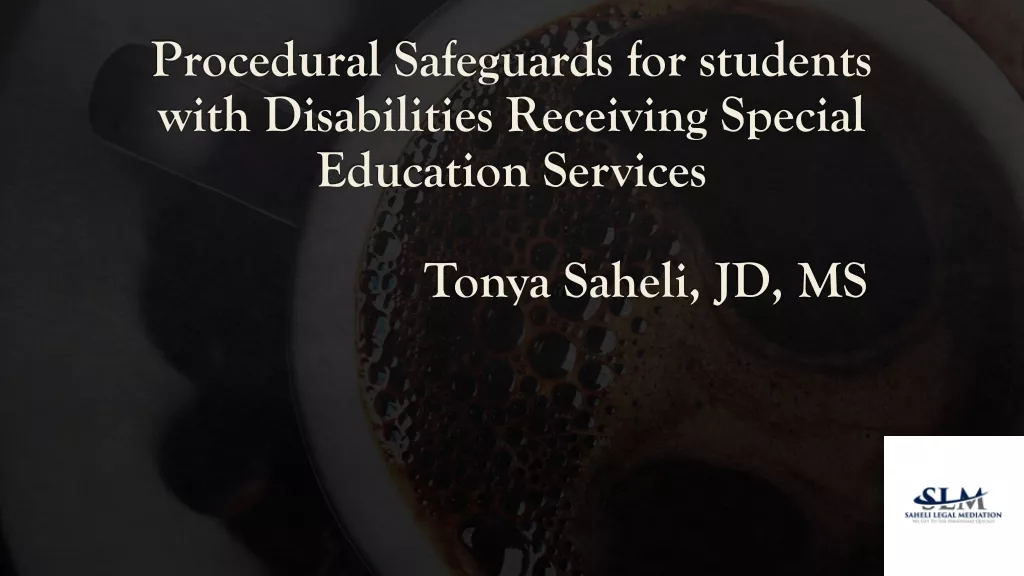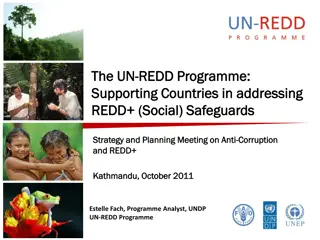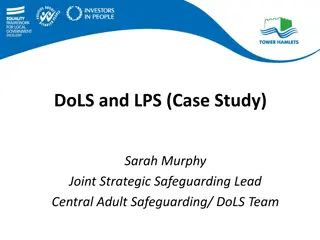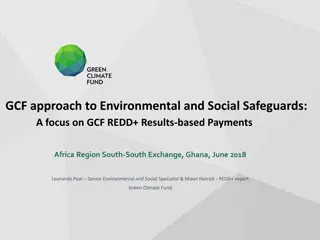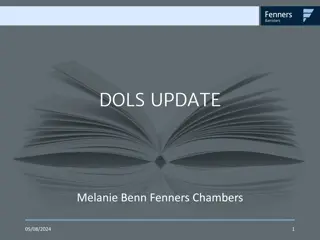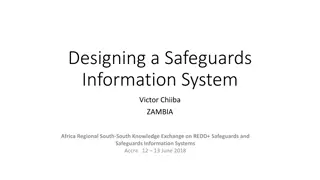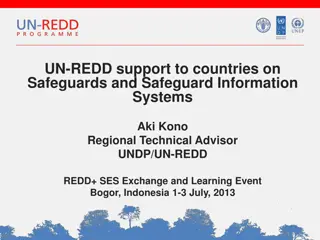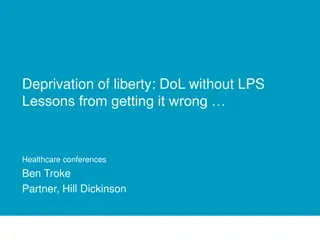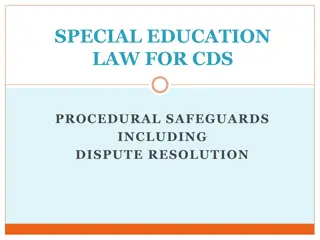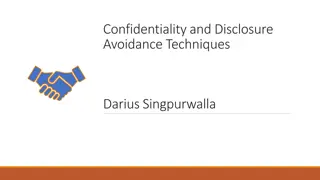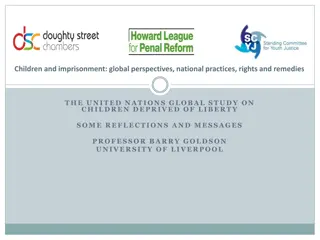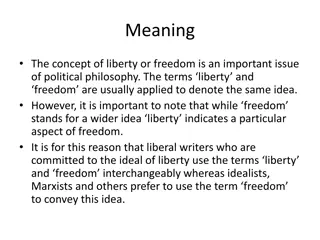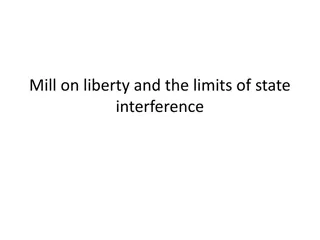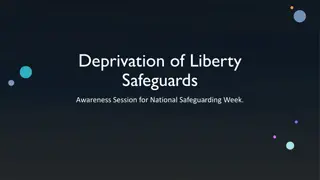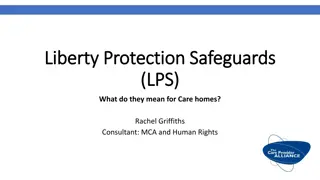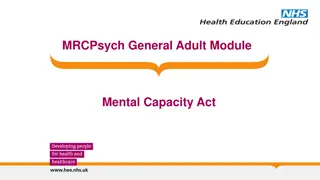Liberty Protection Safeguards Update
Announcements and updates regarding the Liberty Protection Safeguards, Deprivation of Liberty Safeguards, Court of Protection applications, and practical steps for authorizing deprivations of liberty. Details on the delay of implementation, commitment to update the MCA code, and the importance of compliance with DOLS in hospital and residential settings.
Download Presentation

Please find below an Image/Link to download the presentation.
The content on the website is provided AS IS for your information and personal use only. It may not be sold, licensed, or shared on other websites without obtaining consent from the author.If you encounter any issues during the download, it is possible that the publisher has removed the file from their server.
You are allowed to download the files provided on this website for personal or commercial use, subject to the condition that they are used lawfully. All files are the property of their respective owners.
The content on the website is provided AS IS for your information and personal use only. It may not be sold, licensed, or shared on other websites without obtaining consent from the author.
E N D
Presentation Transcript
Liberty Protection Safeguards Liberty Protection Safeguards what now? what now? Contact: hannah@mentalcapacitycat.co.uk www.mentalcapacitycat.co.uk
DHSC update What now? Deprivation of Liberty Safeguards 18+ What now? Deprivation of Liberty COP applications 18+ What now? Deprivation of Liberty 16-17 year olds Re: X applications the COPDOL11 process 16-17 year olds Re:D [2019] UKSC 42 16-17 year olds Bolton Council v KL [2022] EWCOP 24 Practical steps to take for Court of Protection DoL applications Practical considerations for 16-17 year olds
DHSC Update DHSC Update
DHSC update DHSC update April 2023 DHSC announced to delay the implementation of the Liberty Protection Safeguards beyond the life of this parliament. June 2023 DHSC newsletter to inform that the MoJ and DHSC remain committed to updating the MCA code, to ensure that changes in case law and good practice since its publication in 2007 are incorporated. Currently planning to revise the MCA code, considering references on the DoLS code to have an up-to-date statutory guidance.
So what now? So what now?
So what now? Deprivation of Liberty 18+ So what now? Deprivation of Liberty 18+ The Deprivation of Liberty Safeguards remain an important system for authorising deprivations of liberty. Robust systems ensuring compliance with DOLS for those in hospital or residential settings. Managing authorities continue to make applications in line with Schedule A1. Supervisory Bodies continue to fulfil their responsibilities with respect to authorising DOLS applications under the MCA 2005.
So what now? Deprivation of Liberty 18+ So what now? Deprivation of Liberty 18+ Outside of Residential Care Home and Hospital Settings. Court of Protection applications required to authorise DoL. Integrated Care Boards, Local Authorities continue to make Re:X (streamlined dol applications using the COPDOL11 form) Submitting these applications in a timely manner to the Court of Protection
So what now? Deprivation of Liberty 16 So what now? Deprivation of Liberty 16- -17 17 Children s services to make s.16 welfare applications for 16-17 year olds who are deprived of their liberty
Re:X applications Re:X applications
Also known as.(what Ive heard) Also known as .(what I ve heard) The streamlined procedure COPDOL11s (the court form) Community dols DOLIC (dol in the community) COPDOL (court of protection deprivation of liberty) Not DOLS Non res dol
Re:X Applications Re:X Applications the COPDOL11 the COPDOL11 The COPDOL11 is a court form completed by a practitioner on behalf of a public body responsible for funding and commissioning for P or local authority as safeguarding body where a package is privately funded in a community setting. The Re: X procedure is used for: Supported Living Own Home Shared Lives Family Home
Re:X Applications Re:X Applications the COPDOL11 the COPDOL11 The Local Authority/ICB must file a completed COPDOL11 form with the Court of Protection. The form must be verified by a statement of truth It must be accompanied by the following documents: i. Mental Capacity Assessment (COP3) ii. Mental Health Assessment (confirmation of unsound mind from a registered medical practitioner) iii. Best interest documentation iv. Support/Care Plan v. Draft Order
Re:X Applications Re:X Applications the COPDOL11 the COPDOL11 Other documents that may be required: i. Transition plan (where the person is being discharged from hospital or moving placements) ii. Support plan review documentation (applicable in renewals) iii. Copy of any advance decision iv. Copy of any Lasting Power of Attorney Documents v. Any relevant court orders (from previous cases)
Consultation Consultation The body seeking authorisation must demonstrate that consultation has taken place with: a) Others Annex B (family, friends, LPA s Deputies) b) With P Annex C - informing them of the application, what is contained within the application, the proposed arrangements, and that they have the right to take part in the proceedings.
Rule 1.2 Representatives Rule 1.2 Representatives A person who can advocate for P and will be required to provide a statement to court to confirm: That the arrangements which amount to a DoL are in P s best interests They are the least restrictive out of the available options P s wishes and feelings. A 1.2 representative can be: A family member or friend An accredited legal representative or Court of Protection Visitor An Independent Mental Capacity Advocate.
What a Rule 1.2 Representative should confirm via COP24 What a Rule 1.2 Representative should confirm via COP24 Re: VE [2016] EWCOP 16 The judge outlined in this case the key responsibilities: i. Weighing the pros and cons of P s care and support package ii. Considering whether any of the restrictions are unnecessary, inappropriate or should be changed iii. Inform the court about what P has said and P s attitude towards the care and support received iv. Check from time to time that the care and support is properly implemented
What happens when a Rule 1.2 Representative cannot be What happens when a Rule 1.2 Representative cannot be identified? identified? KT & Ors [2018] EWCOP 1 Where there is no suitable friend or family member who can act as a Rule 1.2 representative an independent person will be appointed by the Court to ensure P is represented. An application to authorise should still be completed. The Court will order a Court of Protection Visitor to be allocated
16 16- -17 year 17 year olds and and Deprivation of Liberty Deprivation of Liberty Re: D [2019] UKSC 42 Re: D [2019] UKSC 42 olds
Re:D Re:D - - what was the Court asked to consider? what was the Court asked to consider? The Court was asked to consider who can authorise a deprivation of liberty for a young person who had recently turned 16.
What did the Supreme Court decide? What did the Supreme Court decide? The Supreme Court declared by way of majority that D was to be seen as deprived of his liberty for the purposes of Article 5 which protects D who lacks capacity to make a decisions for himself and prevent him from being arbitrarily deprived of their liberty. Authorisation by the Court of Protection will be required where a 16- or 17-year-old is subject to care arrangements which amount to a deprivation of liberty and the young person lacks capacity to consent to those arrangements
What did the Supreme Court decide? What did the Supreme Court decide? Parental consent does not extend to providing consent to arrangements which effectively result in the confinement of that young person: 49. [It is] not within the scope of parental responsibility for D s parents to consent to a placement which deprived him of his liberty. Although there is no doubt that they, and indeed everyone else involved, had D s best interest at heart, we cannot ignore the possibility, nay even the probability that this will not always be the case. That is why there are safeguards required by Article 5. Without such safeguards there is no way of ensuring that those with parental responsibility exercise it in the best interests of a child
Authorising a DoL for a 16 Authorising a DoL for a 16- -17 year old 17 year old Since the Re:D decision the streamlined procedure, Re:X procedure or COPDOL11 process has been used by authorities to authorise the deprivation of liberty arising out of a 16-17 year olds care arrangements. The Court has provided guidance in the case of Bolton Council v KL [2022] EWCOP 24 that the Court is unlikely to consider that the streamlined procedure is appropriate for authorisation of a deprivation of liberty in the living arrangements of 16/17 year olds. The Court is unlikely to be critical of an applicant bringing an application for authorisation of a deprivation of liberty either by COP1 application or by streamlined (COPDOL11) procedure.
Bolton Council v KL Bolton Council v KL [2022] EWCOP 24 [2022] EWCOP 24
What did the Court consider? What did the Court consider? The case considered an application by the local authority to reconsider the removing an application for an authorisation of a DoL for a 17 year old who was living in a very long standing foster care placement. It was proposed he would remain living there after turning 18 The Court considered the fact that KL was only 17 years old, subject to a care order, had no family contact and would be transitioning to adult services within 12 months. The Court considered for the above reasons the streamlined procedure was not suitable.
What did the Court consider? What did the Court consider? SJ Hilder noted: The streamlined application was devised to meet the minimum requirements for compliance with Convention and domestic law, by abbreviating the procedural requirements of the standard COP1 application process. The difference between the standard and the streamlined court procedures is the intensity of scrutiny. The COPDOL11 process is very definitely not a rubberstamping procedure but it relies on judicial antenna alone to identify from paperwork if/where further enquiry is required. The real question is less about whether a COP1 (welfare application) or COPDOL11 form was used. It was more about whether it is suitable to be run through a paper based process
The Judges views The Judge s views The COPDOL11/streamlined/Re:X procedure was not designed with 16/17 year olds in mind and that some applications are: Factually distinguishable from other cases which pass through the streamlined procedure 16-17 year olds are at a critical stage of their development and about to transition from childrens to adults services. The transition can often be difficult and poorly implemented even where there is no issue of deprivation of liberty Where capacity and DoL does arise, it is much more common with young people than for other age groups that best interest arrangements require the use of restraint and/or sedation Many but not all of the 16-17 year old cases brought before court already have a lengthy history of family breakdown, challenging needs and broken placements. Outside the Court of Protection if a 16 or 17 year old is to be lawfully deprived of their liberty an authorisation from a judge of High Court level is required.
The Judges views The Judge s views A care order is not the only indicator of difficulties to date and the legislative overlap is complicated The Court is also receiving streamlined applications in respect of 16-17 year olds who continue to live with their families. The nature of the challenges which lead to care arrangements amounting to a deprivation of liberty may be different but the state is still involved in those arrangements. The additional layer of complexity that post 18 - the young person s arrangements may be funded by health bodies or jointly with the Local Authority Risk of a young person falling between the cracks due to little joined up working for transitioning from children to adult services The closest family member for a 16-17 year old likely to be a parent or foster parent. It is difficult to see how a parent or someone with similar authority is sufficiently independent and free of other interests to act as a Rule 1.2 representative and the young person should be afforded the opportunity to be joined to proceedings in their own right.
The Judges views The Judge s views An advocate provides an important role in articulating a young person s wishes and feelings but is not in a position to bring to bear any scrutiny of the arrangements beyond that which they see. The resources available for s.49 reports (Special Visitors) are limited increasing the long delay in considering streamlined applications. Accredited Legal Representatives are now an available resource to support in these cases however there is no way to know if an ALR appointed by the Court is sufficiently experienced in all frameworks relating to a 16-17 year old.
The Judges views The Judge s views Experience since December 2019 has shown that, with the benefit of robust scrutiny by fully informed representatives of P, some of the applications relating to deprivation of liberty of 16/17 year olds throw up very worrying issues in transitional arrangements and in respect of restraint; but others can be finalised by consent quickly. The difficulty is knowing on first consideration of the COPDOL11 application which route a particular case is likely to follow.
The Judges views The Judge s views The Court is unlikely to consider the streamlined procedure is appropriate for authorisation of a deprivation in the living arrangements of a 16-17 year old The Court is unlikely to be critical of a COPDOL11 or COP1 application being submitted. The issue post-issue of the application are likely to be substantially the same. Seek legal advice on cases where a 16-17 year old is deprived of their liberty from legal services who will assist in preparing the appropriate application. A COP1 (or welfare application) likely to be the most appropriate way following this judgment.
Practical Steps to take Practical Steps to take for Court of Protection for Court of Protection Deprivation of Liberty Deprivation of Liberty Applications Applications
Steps to take in support of a Court application to Steps to take in support of a Court application to authorise a deprivation of liberty (COPDOL11 or s.16) authorise a deprivation of liberty (COPDOL11 or s.16) A capacity assessment must be undertaken and documented assessment to determine whether the adult/young person can consent or not to the arrangements of their care which amount to a deprivation of liberty. (COP3) Best interest decision documentation regarding residence and care and support arrangements which amount to a deprivation of liberty demonstrating the Best Interest process has been followed, including consultation. The arrangements that amount to a Deprivation of the adult/young person s liberty must be clearly documented in their care plan. (not free to leave and continuous supervision and control.) Once the above complete, seek legal advice on making an application to the Court of Protection (whether by COPDOL11 or s.16 welfare)
Practical considerations for 16 Practical considerations for 16- - 17 year olds 17 year olds
Practical considerations for 16 Practical considerations for 16- -17 year olds 17 year olds Seek legal advice Before a child with disabilities reaches the age of 16, review their living arrangements to see whether the amount to a DoL/confinement In the case of children subject to interim or care orders, the LA should consider whether any children in need or looked after children are (especially in foster or residential placements) confined and whether an application to the High Court is required to authorise the DoL (Re: A-F case) Be proactive be considering as a child is approaching 16 years of age, whether it is likely that child as a young person may lack capacity to consent to the arrangements and take all practical steps to support that child in having capacity upon turning 16 in all decision-making areas due to become relevant to them. Upon turning 16, assume the young person has capacity unless established they lack capacity to consent to care arrangements. If valid consent provided by young person, then no DoL as Article 5 not engaged. Very limited circumstances that they can be relied upon. If a young person lacks capacity and cannot provide valid consent, no one with PR can consent to their confinement on their behalf. Court of Protection application will be required to authorise the DoL. (Section 16 Welfare not a COPDOL11 as per Bolton v KL case) Make preparations in advance of 16th birthday.
Questions? Questions?



